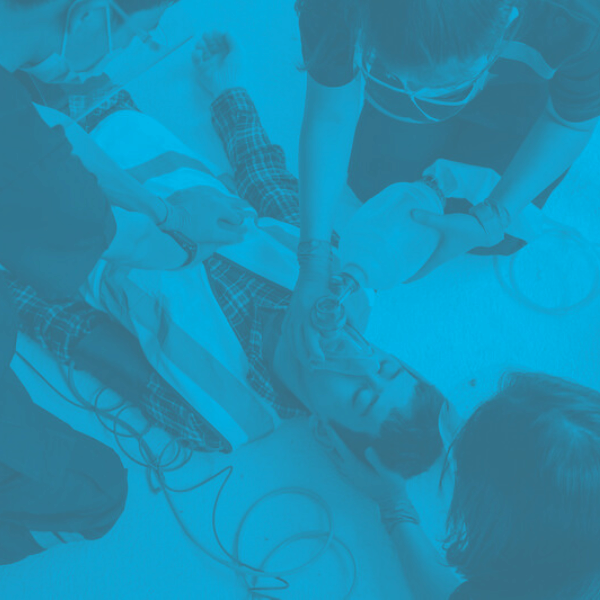Submitting Nursing School Apps: The Value of ACLS Certification
Submitting Nursing School Apps: The Value of ACLS Certification

by Greta Kviklyte
Life Saver, AMC
Co-authored by Kim Murray, RN, M.S.
posted on Apr 11, 2018, at 3:44 pm
It’s that time of year again. Nationwide, hopeful nursing school students are polishing their interview shoes, prepping their transcripts, and pounding the pavement in a crusade to have the best odds of admission in the pool of applicants. While grades play a major role in admissions determination, students can work to proactively enhance their application through preparation and attention to detail, like completing non-required coursework and an ACLS certification course.
We offer Online ACLS Certification and Renewal
Fall admission deadlines are rapidly approaching, but students may still have the opportunity to get their applications ready in time. Students should begin the application process now, using a few tips and tricks to increase the attractiveness of their applications.
Use an ACLS Certification Course to Kickstart Your Application
 A detail-oriented application is a fancy way of noting the importance of accuracy and thorough actions and responses when preparing and submitting your nursing school application. Creating a successful, admission-worthy application requires a bit of preparation, so students must not waste time.
A detail-oriented application is a fancy way of noting the importance of accuracy and thorough actions and responses when preparing and submitting your nursing school application. Creating a successful, admission-worthy application requires a bit of preparation, so students must not waste time.
Begin by completing extracurricular coursework that enhances the application, such as obtaining a First Aid and ACLS certification.
Online ACLS programs are available, and while students can complete these programs at their own pace, they make take a week or more to complete, especially for students working or attending classes full time. Prospective nursing students should sign up for an ACLS class as a way of kickstarting the nursing school admissions’ process. It also gets students in the life-saving mindset critical in nursing.
A detail-oriented application is your best hope of acceptance into nursing school on your first try. As explained by ModernHealthcare.com, nursing school staff shortages are a primary reason for the current nursing shortage. Since the solution lies in getting more students into school and passing their licensure examinations, competition for nursing school admission is intense. More than 78,000 students were denied admission in the 2012-2015 school year for this reason. So, taking steps to streamline your application can help lessen the stress for instructors on the admissions’ panel.
Key Steps in Preparing Your Application
Preparing the physical application is challenging, so use the following tips to hasten the process and make sure everything is complete.
 1. Gather Your Information
1. Gather Your Information
Before submitting anything to your school or the nursing program, research what you need. Gather all information necessary to complete the application, including all past issues involving your mental and physical health history.
2. Submit Your FAFSA and All Necessary Financial Aid Documents
If you will need assistance paying tuition, submit your Free Application for Federal Student Aid (FAFSA) as soon as possible. The FAFSA should be filed in ample time to receive awarded funding before nursing school begins. The Office of Financial Aid may also require students undergo verification, submitting tax paperwork for the applicant and parents or guardians, if applicable. In addition, prospective students should consider applying for nursing scholarships as well.
3. Review Academic Pre-Requisite Courses for Your Program of Choice
Each program lists specific pre-requisites to their nursing programs. Even in the case of Licensed Practical (vocational) Nursing Programs (LPN or LVN), prospective students may need to complete one or more pre-requisite academic classes, such as Anatomy and Physiology, Microbiology, Human Pathology, and Introduction to Chemistry.
Depending on the specific school of nursing, science classes must have been completed with a recent time frame, such as five years or 10 years. If the courses were taken prior to the time frame noted by a school, students may need to retake pre-requisite courses. Moreover, multiple retakes of the same science class, like taking Anatomy and Physiology four times before attaining a passing score, may restrict admission. Students should review their transcript for the age of pre-requisite classes and contact an admissions’ counselor, if necessary, for help in transferring applicable credits and coursework or enrolling in new courses to satisfy pre-requisites for the school of their choice.
4. Get a Physical, and Update Your Vaccinations
Nursing students fall under the vaccination recommendations for healthcare workers. As explained by CDC.gov, healthcare workers may be exposed to communicable diseases and vaccine-preventative diseases, so proactive measures through vaccination are key to reducing the spread of disease. Nursing students, as well as students pursuing an allied health profession, should get a physical prior to applying and update their vaccinations.
Recommended vaccinations include:
- Hepatitis B.
- Influenza.
- MMR.
- Varicella (Chickenpox).
- Tdap or Tdap booster.
- Meningococcal.
If you previously completed your vaccinations, you will need to provide proof of immunization. This includes a shot record or a blood titer, proving your immunity. Students who had chickenpox as a child will also need to submit proof of infection and immunity via a parent attestation or a blood titer.
In addition, nursing students will need to have a recent tuberculosis (TB) test, which requires an initial administration of a medication just beneath the skin of the forearm. The test is read by the administering health professional 48- to 72-hours later. If the area is red or appears raised, it indicates exposure to TB in the past. At this point, a chest x-ray, as well as a letter of medical clearance, may be required for admission to a nursing program.
5. Sign up for and Complete Your Nursing School Entrance Exam
Admissions tests for your college or university may differ from the nursing admissions’ test. For example, students applying to the South Plains College Associates in Nursing Program, located in Texas, must pass the TEAS test, which is in addition to the college’s admission test, the Accuplacer.
Review the testing requirements for the programs to which you apply, and schedule a test as soon as possible. Most schools offer an online practice test, and if necessary, libraries have study guides available to help prepare for the exam.
6. Get a State-Approved Background Check, and Consider the Specific Statutes of Your State Board of Nursing
To protect safety of instructors, students and patients, the State Board of Nursing (BON) requires nursing students complete an FBI-level background check prior to admission. Historically, juvenile offenses could be withheld from the application, but the Patriot Act makes all offenses, both juvenile and adulthood, relevant to the background check process.
For example, the Texas BON stipulates all applicable criminal infractions, even those not resulting in an arrest, as well minor traffic violations, be revealed during the application process. If such actions, including expunged or sealed offenses, are not disclosed at the time of application, the BON may refuse to allow students to sit for licensure, assess a disciplinary fine, or otherwise impede ability to become a nurse.
Although harsh, the stringent nature of background checks reduces risk to those in your care and ensures competency and character. Do not hold back in disclosing information to the BON; minor issues do not necessarily disqualify an applicant. However, failure to disclose issues could.
If any potential history of criminal or mental health issues arise, students may need to obtain a Declaratory Order, which is a formal disclosure to the BON about the applicant’s potential issues. The BON makes a final determination of whether to grant approval for the applicant to enroll in school or issue a formal authorization to test (ATT). Students going through this process may need to a pay processing fee to the respective BON, which varies by state, and submit documentation proving the issue is being managed or handled properly, including submitting proof of treatment for mental illnesses, adherence to court proceedings, or otherwise staying in good-standing with your health provider or legal obligations.
7. Complete Extracurricular Courses, Including First Aid, CPR, and ACLS Certification
Instructors sitting on the admissions’ panel for nursing school consider the whole skill potential of prospective students. This includes students who have demonstrated their willingness to complete coursework, aside from pre-requisite academic classes, in preparation for entering the healthcare field, including volunteering at healthcare facilities and completing their First Aid, CPR, and ACLS certifications. Plus, extracurricular coursework offers significant benefits, including:
- Increasing the possible care settings where you may work, such as acute care environments.
- Improving wage potential.
- Completing continuing education units for use when renewing your nursing license.
- Accepting additional assignments that offer better benefits.
- Working with interstate or international groups as a nurse.
Other Best Practices to Putting Your Best Foot Forward When Applying
 Becoming a nurse is about more than providing immediate healthcare to people; it is about being a positive role model for society. As a result, the admissions’ panel will carefully scrutinize other factors that may contribute to a person’s overall level of character and competency. To demonstrate resolve, prospective students should follow these best practices as well.
Becoming a nurse is about more than providing immediate healthcare to people; it is about being a positive role model for society. As a result, the admissions’ panel will carefully scrutinize other factors that may contribute to a person’s overall level of character and competency. To demonstrate resolve, prospective students should follow these best practices as well.
1. Know How to Write an Open-Ended Response to Application Questions
Depending on the institution, the application may include open-ended questions, such as “Why do you want to become a nurse, or what is your greatest asset and why?”
These questions play a vital role in determining acceptance or denial of student applications. If you are asked to answer an open-ended question, use these tips to write a winning response.
-
- MIND YOUR SPELLING & GRAMMAR!
- Be specific.
- Connect your reason for applying to a personal experience.
- Follow a two-paragraph maximum, containing three or fewer sentences per paragraph.
- Have a co-worker, friend, or family member review your responses to open-ended questions.
2. Include a Copy of Your Transcript and All Applicable Documents With Your Application
Each school will determine which paperwork is necessary for submitting a nursing school application. However, it may be prudent to include hard copies of your school transcript, your background check verification form, and even a personal resume, including recommendation letters from past instructors and work supervisors.
3. Maintain a Well-Groomed Appearance Through All Interactions
All interactions come under the microscope when applying to nursing school. Maintain a kempt appearance, such as wearing a proper hairstyle, removing all visible piercings, wearing clean, pressed clothing, and behaving professional in social settings.
In today’s world, your social media presence may also be reviewed in determining admission. Scour your social media for any images, videos, or content that may shine a negative light on your character, but do not delete existing profiles. This is a highly suspicious move. Instead, give your social media profiles a professional makeover.
4. Be Patient
It can be hard to wait for a response when applying or asking for direction in the application. If you must contact the school, consolidate your questions into a single email, and wait for a response. Do not “spam” the inboxes of everyone at the program in the hopes of getting a faster response. This will only harm your chances of admission.
Prepare as Best You Can, and Enroll in Your CPR, First Aid, and ACLS Courses Today
The physical application may take 30 minutes or less to complete, but that does not mean you can start from scratch and expect to be admitted to a nursing program without a bit of preparation. Follow the tips in this post, and tailor your pre-application steps to the requirements of your preferred nursing school. It can be overwhelming, but words cannot express the reward of caring for others as a nurse.
Join the conversation with your prospective nursing student peers by sharing this post to your social media account. Remember to be professional when sharing, and get started by enrolling in an accredited life-saving skills course today, especially ACLS. You can get into nursing school if you take time to plan ahead.



